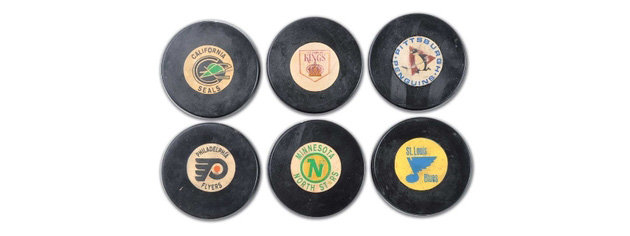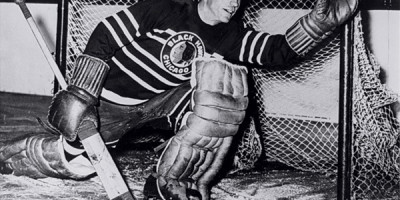From the 1942-43 season through the 1966-67 season, the NHL was an extremely elite club, comprised only of the so-called “Original Six.” While somewhat of a misnomer since only two of the six were founding members of the NHL and the league had previously had as many as ten teams, the name was still appropriate since they were the only surviving franchises from the league’s early years. The league long proved resistant to the idea of change and expansion until a series of events more or less forced the owners’ hands.
In the 1960s, the NFL and MLB both received multi-million dollar television contracts. At the time, the NHL had no such national arrangement in the United States. There was a major difference between the NFL and MLB and the NHL, however. With the NFL-AFL merger, the new league had 24 teams. Major League Baseball had 20 teams in the mid-1960s. Both numbers were a far cry from the much smaller number of teams in the NHL. Due to this, the league was told in 1965 that a national television contract would not be forthcoming without expansion.
The lack of a television offer was not the only thing pressing on the NHL to expand. There were rumors that a TV contract with the Western Hockey League was in the works, and that the WHL had plans to become a major league and challenge the NHL for the Stanley Cup. The NHL had reigned as the undisputed king of the sport since 1926, when the older version of the WHL folded. Such an uprising by another league would be earth shattering to say the least.
The prospect of another league challenging the NHL was a very real threat at the time, as the WHA would prove just a few years after this incident. Prior to the expansion in 1967, there were no teams west or south of Chicago, meaning that most of the continent was unserved by the league. Since the WHL had teams based in Vancouver, Victoria, Seattle, Portland, San Francisco, and Los Angeles, it appeared well-poised to begin filling in that gap.
The NHL was not the only professional sports league to face competition in the 1960s. The NFL had received stiff enough competition from the AFL to force a merger, and the Continental League in baseball, though it never played a game, helped to accelerate expansion in Major League Baseball. Additionally, the ABA appeared in 1967 – the same year the NHL expanded – with the intent of forcing a merger and expanding the NBA.
The combination of those factors was enough to convince the NHL and its team owners that the time for expansion had arrived. In March 1965, League President Clarence Campbell announced that a new division would be created, adding six teams to the league. The new teams were to be given their own division to ensure they would receive an equal share of playoff revenues despite the guaranteed competitive gap. The expansion fee was to be two million dollars. Applications were received from prospective owners in Baltimore, Buffalo, Los Angeles, Philadelphia, Pittsburgh, the San Francisco Bay Area, the Twin Cities of Minnesota, and Vancouver. Interest was also expressed by groups from Cleveland and Louisville, though no formal applications were received from those cities.
The San Francisco Bay Area and Vancouver were deemed “acceptable cities” by the league, while Los Angeles and St. Louis were considered potential expansion locations (though no application was received from the latter), and some expected Baltimore to receive a franchise. However, when the locations for the teams were announced, there were a few surprises. Baltimore’s bid was rejected because its arena was too small. The biggest surprises were the inclusion of St. Louis and the exclusion of Vancouver.
Canadian fans – including Prime Minister Lester Pearson – were outraged that Vancouver was not awarded a franchise. Speculation as to why ran rampant. Many blamed Toronto Maple Leafs owner Stafford Smythe who, following a failed business deal in the west coast city, had said that Vancouver would not receive an NHL team in his lifetime. It was also said that Smythe and Montreal Canadiens David Molson did not want to share CBC television revenues with another team. Others, however, said that Vancouver’s presentation was simply weak, and that that was the true reason for the city’s failure to secure one of the new franchises.
Meanwhile, the Chicago Black Hawks were determined to have a team placed in St. Louis, despite the lack of an application from the Midwestern city. The Black Hawks owned the St. Louis arena, and wanted a team placed in St. Louis so they could unload the arena. At the insistence of the Black Hawks, an ownership group was found, and one of the franchises was placed in St. Louis. Ironically, the team that nearly was not was the most successful of the expansion teams in their first years, qualifying for the Stanley Cup Finals in 1968, 1969, and 1970.
When the dust cleared, the Los Angeles Kings, the Minnesota North Stars, the Oakland Seals, the Philadelphia Flyers, the Pittsburgh Penguins, and the St. Louis Blues emerged. As far as the NHL was concerned, the immediate results of the expansion were mixed. The league did receive increased television exposure in the U.S., but not to the extent hoped. The league also fended off the potential challenge of the WHL, but did not prevent the arrival of the WHA.
Whether or not the expansion is considered an immediate success or not, there can be no doubt that it did pave the way for the long term growth of the game. The 1967 expansion marked the beginning of a new era. Over the following years, the league would continue to grow through further expansion and the WHA merger. The continued addition of new teams necessitated that teams look to new talent pools, resulting in an increase in the number of American and European players in the league. The NHL that we know today is the product of that first round of expansion. Nineteen sixty-seven was one of the most pivotal years in hockey history.
http://www.hockeyforums.net/index.php/blog/67/entry-750-westward-ho/

